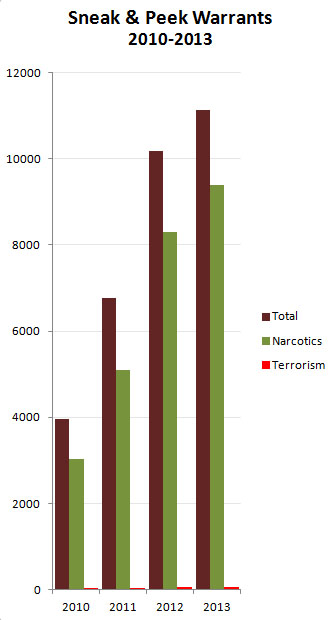The PATRIOT Act gave federal agents expanded powers to issue search warrants without informing the targets of the warrant beforehand. Why? Because terrorism investigations were special: they’d fall apart if terrorists received warning that they were being investigated. So with terrorism suddenly a far bigger priority after 9/11,  national security required that authority for these “sneak-and-peek” warrants be broadened.
national security required that authority for these “sneak-and-peek” warrants be broadened.
A few days ago, the Electronic Frontier Foundation tallied up the known figures for sneak-and-peek warrants:
- 2001-03: 47
- 2010: 3,970
- 2011: 6,775
- 2012: 10,183
- 2013: 11,129
That’s quite an increase. So did terrorism investigations skyrocket over the past decade? Not so much. It turns out that hardly any of these warrants were used in terrorism cases. Instead, they were virtually all used in narcotics cases—as the chart on the right shows. Radley Balko draws the right lessons from this:
- Assume that any power you grant to the federal government to fight terrorism will inevitably be used in other contexts.
- Assume that the primary “other context” will be to fight the war on drugs.
- When critics point out the ways a new law might be abused, supporters of the law often accuse those critics of being cynical — they say we should have more faith in the judgment and propriety of public officials. Always assume that when a law grants new powers to the government, that law will be interpreted in the vaguest, most expansive, most pro-government manner imaginable. If that doesn’t happen, good. But why take the risk? Why leave open the possibility? Better to write laws narrowly, restrictively and with explicit safeguards against abuse.
There’s no reason laws like this can’t be drawn properly in the first place. Sure, some terrorism cases involve narcotics, but that’s a poor excuse. If terrorism is genuinely involved, law enforcement officers have plenty of opportunity to convince a judge of that. A properly-constructed statute won’t get in their way.
This goes for the NSA as well as the FBI, by the way. If they need broadened surveillance powers to fight terrorism—and perhaps they do—a narrowly-drawn statute won’t hurt them. If they object to this, every one of us should wonder why.



















